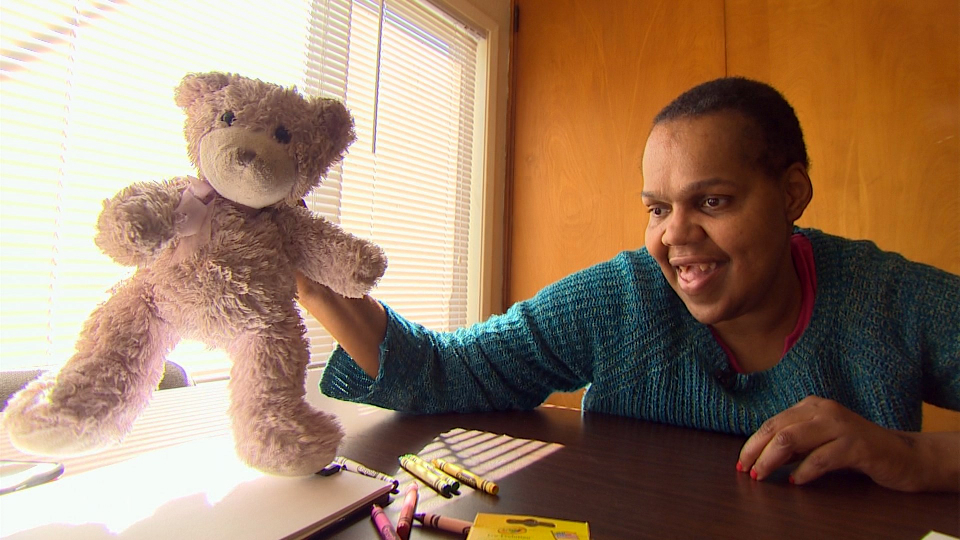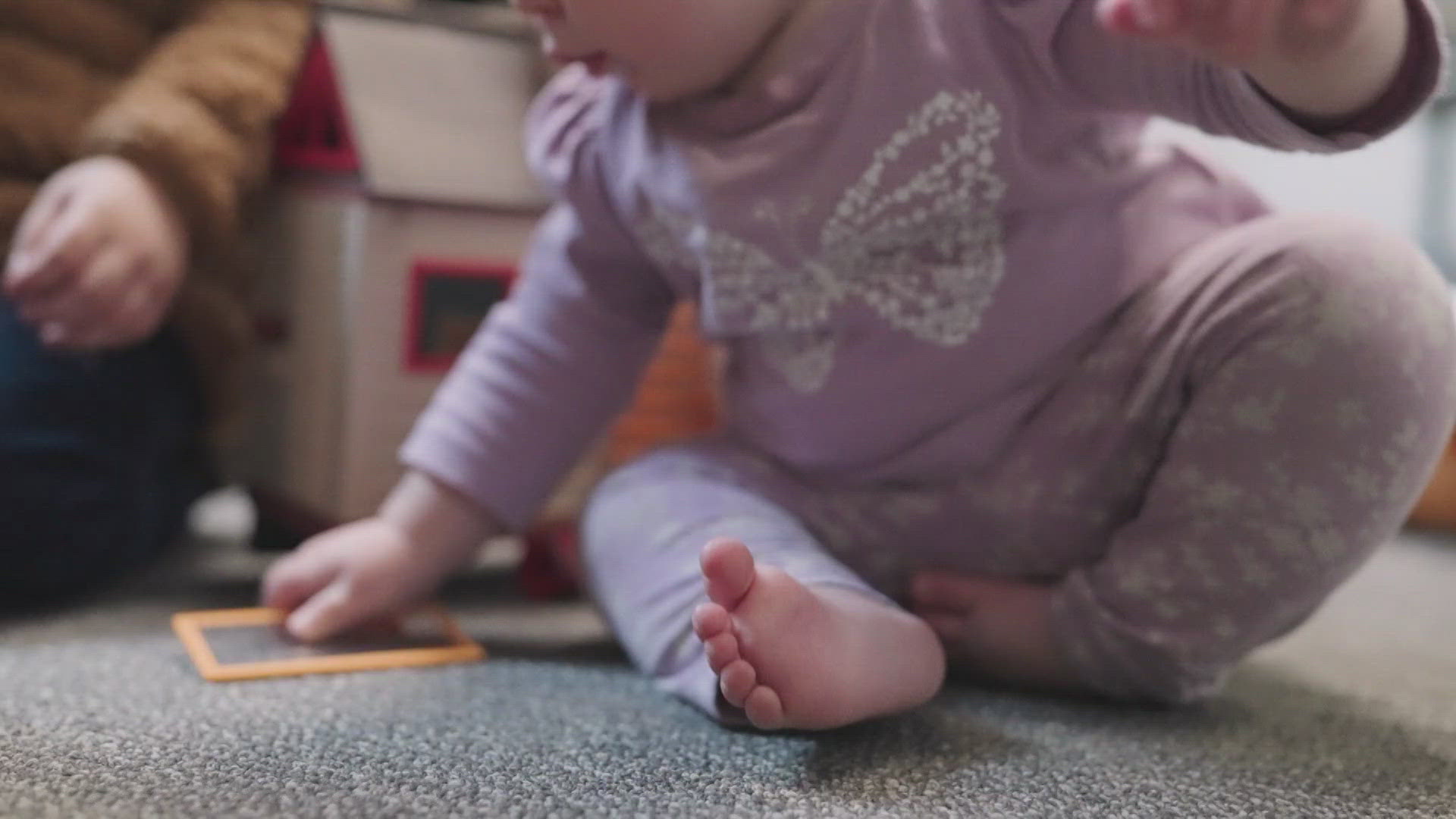Laura Gholston loves to color, sing Twinkle Twinkle Little Star, watch Mickey Mouse cartoons and count to ten - activities most toddlers enjoy. She greets friends and strangers alike with a giant smile, an easy laugh and a loving hug. No one could miss her delightful, innocent spirit.
But Laura Gholston isn't a child. She's a developmentally disabled 48-year-old. She depends on others to tend to her every need: brushing her teeth, changing her diapers, and safely walking her across a street.
In 2011, after seven years in the care of a state-paid caregiver, Laura was rescued from a filthy home in Tacoma where meth and meth addicts were discovered in the garage. DSHS caseworkers and police found her in a back room on a stained mattress without sheets or covers.
She was caked in her own feces and urine. All of her front teeth were rotted out. And covering her arms and legs were fresh and old wounds: burns from a meth pipe.
The state agency charged with ensuring Laura was safe and healthy while paying for her care – DSHS – had miserably failed this vulnerable adult. The case exposes large gaps in the system set up to protect the most vulnerable adults in the state of Washington – those with developmental disabilities.
Laura's problems with the state began 19 years ago, in 1996. At the age of 29, Laura's mother found her daughter in a terrifying state – Laura had given birth to a baby boy, alone, on a toilet in their home in Spanaway. No one even knew she was pregnant.
Laura and the baby were taken to Madigan Army Medical Center where the baby was found to be perfectly healthy. But clearly, Laura could never have consented to sexual relations. Hospital staff contacted the Department of Social and Health Services (DSHS). A caseworker immediately observed, "There is a real question about the protection afforded Laura Mae in her living environment."
Who was the father? Who had taken advantage of this vulnerable adult?
A DSHS social worker forwarded the case to law enforcement. In the referral the state identified the few males who could have had contact with Laura, which included her mother's boyfriend, although the caseworker wrote, "the mother reports she is always present when (the boyfriend) is in her home."
The social worker's notes indicate an aunt had visited and may have brought male visitors into the house. The only other male with access to Laura was a teenage nephew, LaMarcus Gholston, who lived in the home full-time.
Police designated the case a "possible rape," but after that, it appears there was little to no follow up on the part of police or DSHS.
"What happens (on the part of DSHS)? Nothing," said David P. Moody, Laura Gholston's attorney.
The Pierce County Prosecuting Attorneys office declined to file charges against Gholston for the abuse and neglect of his aunt because the alleged crimes didn't reach the level of a felony. The case was forwarded to municipal court for possible misdemeanor charges, but none was filed.
Scroll down to continue reading.
State-paid caregiver is appointed
Four years later the state let Laura down again. Her mother passed away and Laura was without a caregiver. The job would be a challenging one -– someone would need to meet every one of Laura's needs 24 hours a day.
Who got the job? LaMarcus Gholston, the 19-year-old nephew who'd been identified as one of the males that could have impregnated Laura.
State records show that Gholston was not properly screened before being approved by the state to care for his aunt. Gholston passed a criminal background check, but DSHS did not follow its own policies requiring it to ascertain the applicant's character and suitability to provide around-the-clock care.
If DSHS had pursued additional screening, social workers likely would have found that Gholston had had many run-ins with the law and a conviction for marijuana possession. Records would also have shown his name listed on state records as a potential father of Laura's baby.
"That's a decision that is unfathomable," said Moody. "DSHS itself identified Laura's nephew as a rape suspect. That's in DSHS's own documents and paperwork, it's very clear."
The state claims LaMarcus Gholston was never identified as a rape suspect and in fact, had ruled him out back in 1996.
Starting in 2004, LaMarcus Gholston was on the job as his aunt's state-paid caregiver. He received nearly $95,000 over the seven-year period he served as his aunt's official caregiver. And state records show the money was of utmost importance to Gholston. KING 5 found of the 53 telephone contacts between Gholston and Laura's caseworker over the years, 48 of them were about money. Phone records indicate that none of the calls was about social, medical or psychological services for his aunt.
"He bragged, that Laura was his meal ticket, he didn't have to work. He didn't have to do anything. He just got checks from the state month after month," said Ian Bauer, one of Laura's attorneys.
Red flags
Early on signs emerged that Laura was in a troubled home with her nephew in charge. In 2005 a four- year-old niece told her teacher and a CPS worker that LaMarcus "gets the belt" and uses it on Laura. When the CPS worker asked if LaMarcus hit anyone else with a belt, the child responded – "No, just Laura."
The child also said the police were at their house on a regular basis. "All the time. LaMarcus goes to jail all the time but Mommy doesn't."
After those allegations, no one from DSHS checked on Laura.
"We did not do anything," said DSHS representative Leah Stadjuhar in a deposition.
In 2006, LaMarcus Gholston reported to Laura's DSHS social worker, Beth Rubenstein, that he had a job outside the home installing flooring. That would mean Laura's only certified caregiver was not in a position to care for his aunt's needs at all times, which he was getting paid to do. In a deposition Rubenstein admitted she did no further investigation about LaMarcus's outside job.
"DSHS doesn't even bat an eye. They just keep writing checks to a person who isn't even on scene," said Moody of Rubenstein's failure to investigate.
"I would say it's one of the worst cases I've ever seen, yes," said Carol Hunter, a Spokane-based elder law attorney and investigator appointed by the court to look over Laura's civil lawsuit.
"If someone like that - a caseworker who was so apathetic in a deposition -- was the one coming to her home to evaluate her, really delve into what is going on, all I can think of is: she [Rubenstein] walked in, took a cursory look and walked right back out," said Hunter.
The social worker also looked the other way when LaMarcus Gholston notified her he had not completed his state mandatory caregiver training. By policy, that training is to be completed within 120 days or the caregiver contract is to be terminated.
Instead, the state issued Gholston a certificate for "successfully completing" the course anyway. And they paid him for the training as well - $264 in "training wages" for training he never completed.
After Laura's rescue
State payments to LaMarcus Gholston only stopped after Laura's rescue in 2011. A DSHS investigation found Gholston had neglected and abused his aunt, including routinely burning her with a meth pipe.
On the day KING 5 spent with Laura in April, she only turned serious once, when the reporter asked about a scar on her arm.
"It's a burn, a burn. Marcus Gholston," said Laura.
Police found something else in the squalid home in 2011 - a lock on Laura's door only accessible from the outside.
Laura's attorneys included the allegations of imprisonment in their lawsuit.
"She was locked in that room for hours and hours and hours," said Bauer. "He would lock her up while he went to work. He would lock her up just because he didn't want to deal with her. She was a hassle. She was an impediment to him playing video games."
Systemic breakdown
Laura Gholston's case highlights the lack of safeguards for all developmentally disabled adults in Washington state. Those with state-paid caregivers are essentially on their own. DSHS caseworkers are only required to make one annual pre-scheduled visit. Whereas with children, social workers are obligated to check in every 30 days.
"Laura and other vulnerable adults deserve more," said Katherine Kent, a former DSHS social worker and current attorney with expertise in abuse cases. "We have vulnerable adults who are functioning on the level of children yet, we're treating them vastly different, with no safeguards, no protection, no monitoring," said Kent.
Today Laura is living in an adult family home in the Tacoma area where she's safe and able to be herself -– a child with a big smile and a big heart.
On April 17 Laura's lawsuit was settled with DSHS for $2.5 million. The money will remain in a trust to be used for her care and therapies.
DSHS representatives would not comment on any specifics of this case. A media representative said policies have changed for the better since this case was filed but didn't answer when KING asked for specifics.
The department offered the following written statement:
"The Department of Social and Health Services has agreed to settle a lawsuit resulting from a 10-year-old abuse and neglect case involving a woman with disabilities. As the agency charged with promoting the safety of our state's most vulnerable populations, DSHS always considers it a tragedy when one of our vulnerable citizens is harmed.
"Mistakes were made in this case and DSHS did not ensure this client was safe. DSHS typically agrees to settle lawsuits when we have not completed our work to our standards and to ensure that taxpayer money is well spent and the victims receive the care and services they need going forward."
No one at DSHS was held accountable for their failures in Laura's case.
KING 5 brought the Laura Gholston case to the attention of state Sen. Steve O'Ban (R-Pierce County), chairman of the Senate committee that oversees DSHS. He said he is troubled by the case and that it appears no changes have taken place within the agency in an attempt to prevent a similar situation.
O'Ban said he already has staff working on legislation to be presented in the next session to make some accountability mandatory.
"We have got to minimally in those situations have an automatic review, where there was a breach in policy we have to ask the question, 'Why?' And the supervisor and caseworker have to be disciplined. It's just common sense. So that is what I hope to do," said O'Ban.


